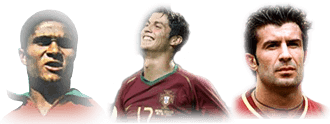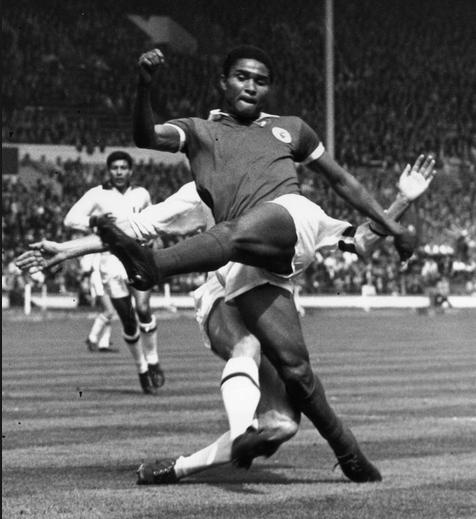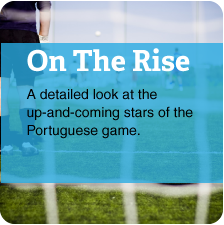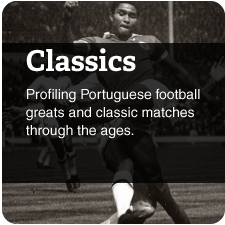“I well remember that the Spanish commentators used to change the tone of their voices every time he came into possession of the ball...” - Santiago Segurola, Marca newspaper, Madrid.
Eusébio Ferreira da Silva, Portugal’s greatest ever footballing talent, national icon and monument to both the barnstorming Benfica side of the 60s and of the first great Portuguese national side of the same era, which took the 1966 World Cup finals in England by storm, certainly seemed to have this kind of effect on all who saw him play.
From his early days in the all-conquering Benfica side of the early 60s to later times as the club’s omnipresent ambassador, the man born to humble surroundings in Maputo, Mozambique, could do little wrong in the eyes of his admirers. And of these there were many. You simply did not see the great Eusébio play football without it leaving a deep and lasting mark on you.
It was on the back of this burgeoning talent that two teams grew to power in the 60s. Firstly that of Benfica, a truly dominant European power in the early years of the decade as the Encarnardos overcame the majesty of a Real Madrid stuffed with legends such as Alfredo Di Stefano and Ferenc Puskas to win the European Cup in 1962. The trophy had practically become Real’s property from its inauguration in 1955, but a Eusébio-inspired Benfica wrought The Cup With The Big Ears away from the tight grasp of the Spanish giants. Simultaneously, Portugal’s national side was coming to prominence for the first time in its history, encapsulating many of the vivid brush strokes of that Benfica side and including many of its prime movers and shakers. Undoubtedly, though, both sides were led by the balance, agility and power of Eusébio Ferreira da Silva.
Legends make way for a Legend
In 1962 in the old Olympic Stadium of Amsterdam, the world was to see what made Eusébio tick for the first time. This was to be the match that brought his magical attributes of skill and speed, a coruscating shot and pinpoint pass delivery to the football world’s attention. That it was the final of the European Champion Clubs’ Cup and that the opponents were five times winners and serial top dogs Real Madrid, only served to make the occasion even more poignant, even more special and to make the player’s entry into the limelight even more striking.
Eusébio, with a strong but lythe frame on his 20-year-old legs, watched as the old guard of Di Stefano, by this time 37, and Puskas (35), cajoled the Spanish champions into a 3-2 half time lead. In a scintillating second half of mesmerising power and balance, Eusébio led his team-mates back to win the match 5-3, bagging a brace himself. The image of the old general Puskas handing over his shirt to the young buck Eusébio at the final whistle could easily have been viewed as a changing of the guard. The old kings were dead, long live this dynamic new one.
Throughout the 60s the man from Maputo, who had so nearly joined Benfica’s eternal rivals Sporting on arrival in Portugal, led Benfica and Portugal to untold heights. 727 goals in 715 Benfica appearances (including an incredible debut hat-trick) told its own story, whilst the engrossing tale of what his country achieved in England under his sway has also long fallen into legend.
Wembley heartaches
In a career stacked full of trophies, awards and plaudits from all round the planet, Eusébio's appearances were - curiously - not short of disappointment. As well as the tearful exit from World Cup 66, so famously captured in the photographs of the time at the end of a sweat-streaked and dramatic semi final at Wembley between Portugal and England, there were more Wembley woes in 1963 (lost European Cup final against AC Milan) and 1968 (another European Cup final defeat, this time to Bobby Charlton’s Manchester United). Of all the great footballing shrines that this grand master bestrode, Wembley was never properly tamed.
As with any story of true Portuguese greatness, the sad moments only served to bolster the legend. In a country where the notion of saudade (longing for the homeland) is so prominent and where the doleful imprint of fado music can be identified on every street corner of the ancient quarters of the city, Eusébio's story of triumph against adversity and ultimate infrequent failure has marked him down as a true man of the people. His close relationship with the country’s most prominent fado singer, Amália Rodrigues, was somehow apt for this man from Mozambique, who came to personify everything that is Portugal and the Portuguese. He was humble in triumph and generous in defeat, a champion who was just as likely to embrace a tearful loser as he was to be found celebrating with his own team-mates, a man just as likely to be busying himself with a distraught colleague as charging to gain the acclaim of the crowd.
1966 And All That
It is curious how so many of the iconic images printed capturing the balletic majesty of Eusébio were taken at the World Cup finals of 1966 in England. It was perhaps the zenith of the great man’s career, despite it all ending in tears in the Wembley semi final with the hosts. But there is perhaps another reason for all these images of ’66. As the respected Portuguese columnist Nuno Rogeirio noted shortly after the great man’s death in January 2014, “...it is of course in the United Kingdom where people well know who this colossus was and what he was worth. We have probably only seen two real giants of football in my lifetime, Eusébio on hauling Portugal back from the brink against North Korea in 66 and Cristiano Ronaldo’s recent virtuoso performance in Sweden...”
Eusébio was the darling of the Portuguese football nation, for grandfathers growing up on his swerving skills to youngsters brought up on the fables of old and the omnipresent images of the great man at Benfica and national team occasions.
The story of his 1966 participation in Portugal’s first ever World Cup finals reveals how England became the venue for perhaps Eusébio’s finest moments in football.
By the time he reached the shores of England in preparation for the 1966 World Cup finals, Eusébio was already a big name on the European circuit. He had already been champion of Portugal with his beloved Benfica four times (60-61, 62-63, 63-64 and 64-65), played in three European Cup finals (winning just one) and was a huge star on the football stage. The biggest stage of them all, however, is the World Cup and Portugal arrived in England with slim hopes of hitting the headlines. Although the team contained some notably strong players, José Augusto, Coluna, Hilário and Torres amongst them, it was recognised that Eusébio would be the man to watch.
Who could have guessed then, by the time he left the great stage of Wembley in the semi finals, the man from humble beginnings in the district of Mafalala in what is now Maputo, Mozambique, would never again be able to avoid the flashbulbs of the press and the adoring gazes of the public.
The team touched down at Ringway Airport, Manchester full of expectation and trepidation. Their early matches would all be played in the north, at Goodison Park and Old Trafford, where the might of Brazil, the tricky Hungarians and the virtually unknown Bulgarians lay in wait for first time qualifiers Portugal, in a complicated-looking Group Three. To the surprise of many, and aided by the stunning form of Eusébio, Portugal won their first two group games, 3-1 v Hungary and 3-0 against Bulgaria, setting up a crucial last game against the Brazilians, who needed to win to stand any chance of progressing, having been surprisingly beaten by the might and guile of Bene and Farkas of Hungary in their own second group game.
62,000 crammed into Goodison Park to see the fight for survival. Armed with a plan to rough up an already partially injured Pele, whilst getting the ball as often as possible to their own superstar, the Portuguese prevailed in a manner that surpassed the most optimistic of hopes, taking an early grip on the match through goals from Simões and Eusébio, before responding to Rildo’s 70th minute strike for Brazil with another master goal from Eusébio, still considered to this day one of the World Cup’s most picturesque strikes. Portugal were through. Eusébio was the hero. The knock-out rounds were in sight.
That match…
In those simple days, a team emerged from the group stage to take part in the quarter-finals of the cup. Sepp Blatter would do well to dip into the historical annals to see how this created an immediate wave of excitement amongst the public and the participants. Portugal would travel further north to Middlesbrough’s Ayresome Park where Italy’s conquerors, the complete unknowns from North Korea lay in wait. This was to be the match that cemented Eusébio's reputation for all time. North Korea, then as now a communist state, had arranged for its national team to play in the communist sister East German league, thus gaining fitness and know-how of how to play against tough European adversaries. The match was, for this reason, not the would-be walk-over that many uninitiated fans in the streets of London and Lisbon expected it to be. In fact it would be anything but....
Trailing 3-0 to the Koreans after just 25 minutes, Eusébio produced a display of world class marksmanship and indeed leadership to drag his country back from the brink of total ignominy. By half time he had scored twice to make the score 2-3. By the end it was 5, four of which were down to the guile and power of Eusébio. Ayresome Park stood and applauded to a man, as the victorious Portuguese took their leave of northern England. A date with destiny awaited them further south: England at Wembley in the semi-final of the World Cup.
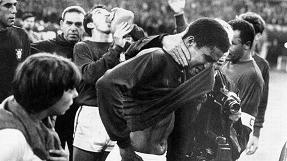
Tired of English barbecues with unsalted meat and the overcooked watery pap that served as vegetables, Eusébio famously requested team-mate José Augusto to cook some Portuguese bacalhau (salted cod) and some bifes (well seasoned steaks) before the big game. He was pictured with his team-mates strolling in Kilburn and checking out the record stores of Camden. The relaxed approach went down well with the players but the belated home cooking had little effect and the dream ended in glorious failure at Wembley and the now iconic images of Eusébio inconsolable at the end, but still with the dignity to greet and congratulate Gordon Banks and Bobby Charlton in their moment of triumph, images that would travel the world and build the legend of this humble man become superstar from Maputo. Eusébio had tried everything he knew, but goals from Bobby Charlton and the limpet marking of Nobby Stiles had done for him and his team-mates.
This was to be perhaps the biggest disappointment of his long career, which after so many years at Benfica, would see him turn out very briefly for Beira-Mar, União de Leiria and Toronto Metrostars. Eusébio would score once more in the successful 3rd/4th place match against the USSR, landing the Golden Boot as tournament top scorer. His nine goals in England, along with his scintillating forward play, humility in defeat and engagingly photogenic smile would elevate him to superstar status.
The legend of Eusébio had finally gone out to a global audience and, for his friends and family, gathered in his favourite Lisbon restaurant, the Adega da Tia Matilde, life would never again be quite the same.
EXTRACT - THE EUSÉBIO STORY IN HIS OWN WORDS
I Walked Off with My Head in the Clouds ...
(by Eusebio of Benfica and Portugal from ‘International Football Book No.9’ Souvenir press Ltd, London, 1967)
Until I was 12 I’d never even seen real goalposts, but for as long as I can remember I’ve been playing football. In Mozambique, where I come from, there’s not much grass but plenty of open ground, and wherever one looks, almost, you can see youngsters kicking a ball around with sticks to mark the goals and usually everyone playing barefoot.
That’s how it started with me, too; though I was one of the lucky ones taken on as an amateur by the Sporting Club of Lourenço Marques. I was 15 at the time, raw but eager to learn and already having something of a reputation being a goalscorer.
At 18 I was a regular player in Sporting’s first team, and at the end of my first season Sporting were Champions and I was the top scorer in the League. At that time we had a visit from one of the top Brazilian clubs, São Paulo FC, who stopped off in Mozambique on their way to Europe.
As Champions, Sporting played a friendly with São Paulo and, scoring a couple of goals that day, I heard later that their manager had wanted to sign me. Unfortunately Sporting had asked a fee of 20,000 dollars and the São Paulo directors didn’t think it worth while paying such a fee for an unknown boy.
As it turned out, the visit of São Paulo F.C. set off a chain of events that took me to Lisbon and Benfica, for later on their tour the Brazilians played in Lisbon. By the strangest coincidence the Benfica manager Bela Guttman and Jorge Bauer, formerly a Brazilian international wing-half and now boss of São Paulo FC, were old friends.
Guttman had been coach of São Paulo for a spell during Bauer’s playing days and the two men met, quite by accident, in a barber's shop in Lisbon. During their conversation Bauer mentioned that he’d wanted to sign a player in Mozambique, and hearing all about me Mr. Guttman decided to see me for himself.
‘If Baucr thinks this boy is worth 20,000 dollars he must be good,’ Mr. Guttman told the Benfica President, and a five weeks later he came to Lourenço Marques himself, I signed, and returned to Lisbon with him and then the trouble started.
Sporting Clube de Lisboa insisted that I belonged to them although I’d never signed any agreement with them. Apparently the Sporting Club of Lourenço Marques was formed by former Sporting Lisbon fans and for years there’d been an agreement between the two clubs.
I found myself, unwittingly, in the middle or a great struggle between the two clubs, and the dispute raged on and on. Sporting appealed to the Portuguese FA and later went to court before it was finally agreed that I would stay with Benfica. The squabble went on for more than seven months, and for all that time I was kept in hiding.
With two of the Benfica coaching staff I was taken to a quiet hotel in a tiny fishing village on the Algarve coast in Southern Portugal. It wasn’t at all what I’d expected life to be like in Europe, very quiet, with few people about and a daily training stint alone on the beach.
The dispute was finally settled early in 1961 and a few weeks later Benfica met Barcelona in the first of their European Cup Finals. At the Wankdorf Stadium in Switzerland, I sat on the trainer’s bench with several other reserves watching Benfica win 3-2.
Less than a month later Benfica were invited to Paris, where Racing Club were staging their annual international tournament. Though Benfica took part as European Champions it was the Brazilian aces Santos FC who were the big attractions, and as expected both teams qualified for the final.
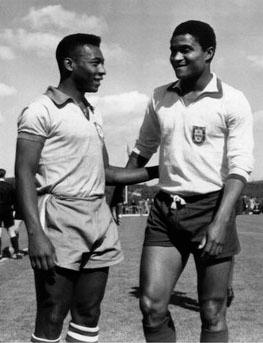
Once more I was sitting amongst the reserves watching the game - and watching Pelé at his greatest. By half time Pelé had scored a hat-trick and Santos had the game well in hand. I hadn’t expected to play, for Bela Guttman had explained to me that though tempted to play me in the European Cup Final he had decided against it in view of my inexperience, and would slip me into the team in relatively unimportant friendly matches during the summer.
With Santos leading Benfica 5-0, the boss no doubt thought the experience would do me good and with half an hour left he put me on in place of inside-left Santana. Those thirty minutes went like a dream for me. After only five minutes Benfica captain Mário Coluna opened up the Brazilian defence with a great run and though he could have scored himself he pulled the ball back for me. ‘Shoot!’ he said, ‘Shoot!’ ... and there was Gilmar, Brazil’s World Cup ’keeper, picking the ball out of the net.
Before the end I was lucky enough to score twice more and Pelé got another for Santos to give them a 6-3 win, but I walked off the Parc des Princes with my head in the clouds.
The following season everything happened just right for me. I kept a regular place in the first team, and after eliminating Tottenham Hotspur in the semi-final we beat Real Madrid 5-3 in Amsterdam. Though I scored two of Benfica’s goals that day, and have hit many more since, I can’t imagine any goal giving me a greater thrill than those I got on my debut against Santos.
With modern football’s willingness to discard memories of the greats from a sepia-tinted age and thrust a new breed of muscle-bound millionaire stars upon us as the best of breed, it is easy to forget just how good players from Eusébio’s era were. Practically every country had their handful of world class performers and it is no exaggeration to say that, in a time that did not lack in wonderful practitioners of the beautiful game, few stood higher than Eusébio and that even fewer stand higher today
by Simon Curtis

